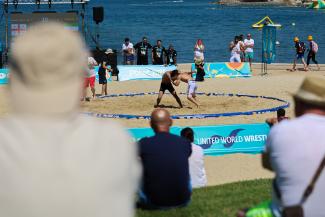Elsayed Collects Second World Title in Less than Two Weeks at #WrestleBudapest
Sunday, November 3, 2019 - 18:46 By Taylor Miller

Photo of Mohamed ELSAYED (EGY) by Kadir Caliskan.
BUDAPEST, Hungary – Mohamed ELSAYED (EGY) capped off an amazing two-week run that saw him travel to two different continents to compete at two World Championships events, which he won.
Elsayed, who won the World Military Games just 10 days ago, dominated his way to the crown at the 2019 U23 World Championships on Sunday in Budapest, Hungary.
The returning U23 World champion Elsayed faced 2018 Junior European champion and 2019 U23 European bronze medalist Aliaksandr LIAVONCHYK (BLR) in the 67 kg Greco-Roman title bout.
Elsayed used a strong first period to take a 5-0 lead into the break with a pair of gut wrenches after Liavonchyk was put down in par terre. Moments into the second period, Elsayed finished off the match with a takedown right into a gut wrench on the edge of the mat for a 9-0 victory.
Now a two-time U23 World champion, Elsayed wraps up an impressive 2019 season with a U23 World title, a World Military Games title and a fifth-place finish at the 2019 Senior World Championships in September to qualify for the 2020 Olympic Games.

Photo of Arvi Martin SAVOLAINEN (FIN) by Kadir Caliskan.
A pair of Junior World champions went to battle for the gold medal at 97 kg as 2018 Junior World champion Arvi Martin SAVOLAINEN (FIN) took on 2016 Junior World champion Giorgi MELIA (GEO).
Savolainen opened scoring with a four-point takedown, putting Melia to his back for a moment. Georgia challenged the call, but it stood, adding another point to Savolainen’s side of the scoreboard.
Later in the match, Melia scored a correct throw and was awarded a point for his opponent’s passivity, but it was not enough and Savolainen took the gold medal with a 5-3 victory.
At 60 kg, Armen MELIKYAN (ARM) knocked off 2018 Senior World silver medalist Zholaman SHARSHENBEKOV (KGZ) in the first gold-medal match on Sunday night.
Melikyan led 4-4 on criteria at the break, thanks to a big four-point takedown halfway through the first period. In the second period, Melikyan and Sharshenbekov traded the lead, each scoring on step outs, but the Armenian hit a throw for four points, giving himself a lead that the Senior World runner-up could not overcome for an eventual 11-7 decision.

Photo of Milad ALIRZAEV (RUS) by Sachiko Hotaka.
For the title at 82 kg, 2019 Russian Nationals bronze medalist Milad ALIRZAEV (RUS) topped 2016 Junior World silver medalist Vjekoslav LUBURIC (CRO) in a first-period technical fall.
Alirzaev got a chance on top in par terre. The two had a wild scramble that ultimately resulted in a gut wrench for the Russian, but among the action, Luburic executed an illegal move to get hit with a caution-and-two.
Croatia challenged the call, but it failed, and they restarted in par terre, where Alirzaev scored quickly on a gut wrench for an 8-0 win in just two minutes.
The gold-medal bout at 72 kg resulted in a shutout victory for 2019 Senior Asian champion Mohammadreza GERAEI (IRI), who defeated 2012 Cadet World bronze medalist Sanan SULEYMANOV (AZE).
Geraei was on the board early, drawing a passivity from Suleymanov and capitalizing in par terre with a correct throw to go up 3-0. Not long after, Geraei scored a four-point throw for a 7-0 lead at the break. With no scoring in the second period, Geraei secured the gold medal with a 7-0 win.
In the team race, Iran came out on top with 122 points, thanks to three individual Greco champions, edging out second-place Georgia’s 121 points. Taking third was Russia with 118 points.
Finals results
60 kg
GOLD - Armen MELIKYAN (ARM) df. Zholaman SHARSHENBEKOV (KGZ), 11-7
BRONZE - Artur PETROSIAN (RUS) df. Zhora ABOVIAN (UKR), 9-0
BRONZE - Mehdi Seifollah MOHSEN NEJAD (IRI) df. Krisztian KECSKEMETI (HUN), 9-5
67 kg
GOLD - Mohamed ELSAYED (EGY) df. Aliaksandr LIAVONCHYK (BLR), 9-0
BRONZE - Artur POLITAIEV (UKR) df. Katsuaki ENDO (JPN), 9-0
BRONZE - Sajjad Ali IMENTALABFOUMANI (IRI) df. Deyvid DIMITROV (BUL), 2-0
72 kg
GOLD - Mohammadreza GERAEI (IRI) df. Sanan SULEYMANOV (AZE), 7-0
BRONZE - Valentin PETIC (MDA) df. Nao KUSAKA (JPN), 6-3
BRONZE - Maksym YEVTUSHENKO (UKR) df. Ramaz ZOIDZE (GEO), 4-3
82 kg
GOLD - Milad ALIRZAEV (RUS) df. Vjekoslav LUBURIC (CRO), 8-0
BRONZE - Yevgeniy POLIVADOV (KAZ) df. Arman VARDUMYAN (ARM), 16-7
BRONZE - Aivengo RIKADZE (GEO) df. Tamas LEVAI (HUN), 4-2
97 kg
GOLD - Arvi Martin SAVOLAINEN (FIN) df. Giorgi MELIA (GEO), 5-3
BRONZE - Dzmitry KAMINSKI (BLR) df. Ravi RAVI (IND), 8-0
BRONZE - Mohammadhadi SARAVI (IRI) df. Vladlen KOZLIUK (UKR), fall
Final team standings
1. Iran – 122
2. Georgia – 121
3. Russia – 118
4. Ukraine – 77
5. Belarus – 69
6. Japan – 65
7. Turkey – 65
8. Armenia – 64
9. Kazakhstan – 54
10. Hungary – 42


Share your thoughts.
Comments